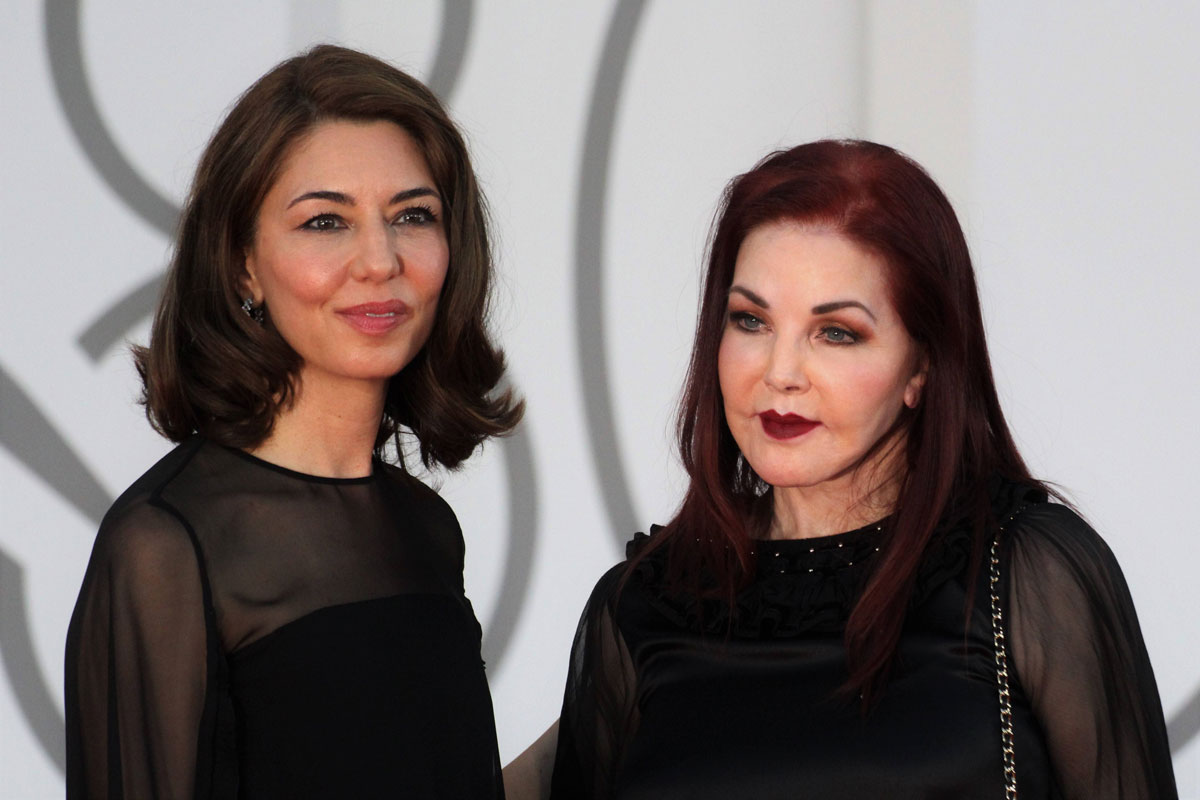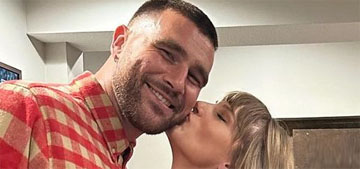Sofia Coppola is one of the OG Nepo Babies but I also think her talent and work ethic are undeniable. She’s covering W Magazine ahead of the release of Priscilla, her upcoming biopic about Priscilla Presley. The photos in the magazine story are elegant black and white, and Sofia’s sporting a perfect smokey black wing eyeliner. There are new details in the interview about the movie, including how many costumes Cailee Spaeny wears as Priscilla: 120! And Sofia also mentions how Priscilla Presley reacted to the script. She went through it page by page and fact-checked small details. Sofia also empathized with women of Priscilla’s generation, who had a harder time leaving their husbands.
Cailee Spaeny wears 120 costumes in the film!: For the 30-day shoot in Toronto, Stacey Battat, Coppola’s longtime costume designer (who once worked at W as a style assistant), had to fabricate, commission, or organize 120 looks just for Priscilla. Coppola tapped into her fashion relationships: Chanel made Priscilla’s wedding dress in the same style as the original, and Valentino created suits and knitwear for Elvis, who is played by Jacob Elordi, known for his work on Euphoria. “We had about 100 outfits for Elvis and his pals, the Memphis Mafia,” Battat recalled. “My joke was that the Memphis Mafia had more costumes than they had lines.”
Priscilla Presley influenced both Sofia and Cailee: Both Coppola and Spaeny had spent time with Priscilla Presley herself. “She was open and complimentary of my work,” Coppola recalled, “but she was a bit tentative. I sent Priscilla the script, and she went through it page by page and gave me specific details, like ‘I didn’t have a teddy bear on my bed.’ But, in the end, I did reinvent some things, like Elvis’s bedroom. I wanted him to have a man cave—very dark and mysterious.”
During production, Priscilla offered to tell Spaeny exactly what she had felt before every scene in the script, before any encounter with Elvis. “We had many phone calls, but once I started filming, I stopped speaking to Priscilla because it became too overwhelming,” said Spaeny. “In the end, it had to be Sofia’s vision.”
It was harder for women to leave their husbands back then: “I was so impressed that Priscilla left Elvis,” Coppola explained. “She was always trying to be his fantasy, his ideal woman. I think about my mom’s generation and how hard it was to be independent. Women without any power or money at that time had nothing when they left their husbands. Priscilla had courage, and that seemed, to me, to be a universal theme.”
There was a tweet making the rounds on my corner of the internet recently about how long marriages in “ye olden days” weren’t necessarily happy marriages. They were long marriages because it was harder for women to get out of them. Even though Priscilla was famous, she was isolated, and it did take courage for her to leave Graceland. I excerpted the part where Cailee and Sofia talk about her involvement because I sensed…an undercurrent. It comes across like Priscilla wanted more control than Cailee or Sofia were interested in giving. What Cailee says is especially striking–that she stopped speaking to Priscilla because Priscilla was overwhelming her. I know why Priscilla wanted to be so closely involved–it is her life story after all. At the same time, artists are always going to interpret things differently and bring their own perspectives to a story.
photos credit: IMAGO/Manfred Segerer / Avalon, MPP/Avalon, Getty and via Instagram/W Magazine















When Olivia Harrison (George Harrison’s wife) was asked the secret to a long marriage she said, “We didn’t get divorced.” That says it all.
Olivia Harrison also understood and accepted who her husband was.
I remember watching the documentary on HBO All Things must Pass, and she seemed accepting that her husband was not going to be the typical, faithful Trad husband. she understood who he was, and was able to negotiate what that meant to her marriage. not an easy task. personally, I could not accept a husband who was not faithful, but I do understand that many wives deal with this as part of their every day married lives.
Priscilla was 14 when Elvis wooed her. there was no way for her to understand at her age what she was walking into. I may not agree with everything that she did, but I can respect how she dealt with the estate after the fact, and kept Elvis from his own demons.
also, was trying to update but got timed out.
I do think that it WAS harder prior to 1970s to extradite yourself from a problematic marriage. the courts and laws did side with the male dominant society.
it wasn’t really until the late 70s that a woman could leave her marriage, and most of them receive custody of her children. Prior in order to to leave, she had to leave her children behind. Which really did keep many women in marriages that were not optimal. they were expected to accept and manage the relationship.
@LNuzo- It was still hard to leave a marriage in the 70’s most women were still under educated, and had no experience working. You couldn’t get your own credit card until the mid 70’s. My Mom made more money as a nurse than my dad did working for the city in the comptroller’s office. Yet, she couldn’t get a card in her own name until 1974. Buying a house or renting an apartment without a male to co-sign for you was next to impossible. The 70’s weren’t that easy.
Yeah, George cheated a *lot*. While Ringo was married to his 1st wife Maureen, George pursued Maureen! It was towards the end of their marriage and they were already having problems, but still, George didn’t make that situation easier, I’m sure.
A federal law was passed in the mid 1970s to allow all women in the US the ability to open a bank account on her own. (Some states already allowed it, starting in the 1960s.) And it has been said that impeding a woman’s getaway is a reason why most dresses didn’t (don’t) have pockets; it’s so a woman couldn’t hide important documents or money in them. And let’s not started on stiletto heels and how they limit movement.
It was really difficult for women to get away from a bad situation. And unfortunately, historically, the law and fashion was complicit in this.
It’s still hard if you are a stay at home mom or even reduced outside work hours to take on the added load of childrearing. I’m going through a divorce now and my husband is taking the position that “I didn’t want to work” so his money is his, despite me scaling down work hours (I never “stopped” working) to make sure our two kids got on the bus, off the bus, had food waiting when they got home, and got help with their homework, etc. He wasn’t doing any of that as a law enforcement officer.
@mimi your comment made me cry this morning because I’ve done almost the same as you but I sold my business then opted for less work. No divorce yet but I feel stupid about it all the time. I’m in your corner and I really hope it works out well for you.
Thank you, @K. Tate. I appreciate it.
@Mimi and @K.Tate — From a woman in the exact same spot, I’m sending support and solidarity your way. I am divorcing my husband of 20 years, which I announced to him two days ago, and this is the first place I have shared it with anyone outside of my home. The way women give up their prime earning years to work in the home, is extremely dangerous to women’s safety and security. I have done 100% of the childcare and household tasks, but to hear my husband tell it, I have done no work and made no contribution. The turning point was when I read this (http://www.aspergerpartner.com/the-burden-on-nt-spouses-and-children-otrs-2.html), and a light switch flipped on. I will walk away with my children, my dogs, and my house, with no job, no child support, no alimony, no career prospects, and not a penny to my name, not even to pay the mortgage. Twenty years of unpaid labor. Marriage benefits men, definitely not women, and whatever the cost, I am resolute about getting out and never looking back.
@MEH – Holy s^*# thank you for sharing that link. I’ve forwarded it to my other healthcare buddies and we are definitely going to discuss.
OMG that article!
My divorce isn’t final, and I am just starting to feel the joy and every day without having to walk on eggshells.
My story: I’m an idiot that made hundreds of thousands of dollars a year and supported my husband; bought vacation homes, trips to Europe, sent my kids to the best summer camps in other countries and now I’m paying child support to the cheating Nutjob who traumatized me for the last six years of our marriage.
I’m relieved to have already had one marriage behind me and to have two beautiful children. Because honestly, j there are zero advantages to a woman in a marriage, but I didn’t want to have children out of wedlock.
@meh your post is like a gut punch. I am so very sorry this happened to you. I understand how you feel. It’s scary and it’s stressful. Making up your mind and spirit to leave is your first step out of darkness. I wish you the best and I know you will be happier…
I’m sorry to hear you’re all going through that. I was there, in the sense that I was working a less lucrative/demanding job so I could take care of the kids and keep things running at home while my husband climbed the ladder. If I had wanted out of the marriage, that would have been me too.
There’s a line in a Mary Chapin Carpenter song called “He Thinks He’ll Keep Her,” which I think is based on her own mother. She married right out of college, had three children and was the stay-at-home parent until her mid thirties. When she decided to divorce (I think in the early to mid 1970s), all of her years of organizing and childcare and housework and meal-planning didn’t give her financial stability.
The line was “For 15 years she had a job, but not one raise in pay. Now she’s in the typing pool at minimum wage.”
Mimi, my heart goes out to you. I hope the divorce resolves itself soon, that you have good girlfriends to support you, and you find a good therapist if you decide to go that route.
I also hope you have a great lawyer.
This happened to my mother when my parents divorced. My father received all the benefits from his 20 year career. She got nothing for her 20 year contribution. But my mother does not give up. She got a paralegal degree at a community college and for the next 20 years worked, saved, invested. Eventually she was worth a quarter of a million dollars. She loved to tell everyone that. And she was much happier, without my dad dragging her down.
sending love, hope, and strength to all the amazing women in this thread. I wish y’all safe space, freedom, and healing.
I am, perhaps, hypersensitive to overgeneralizations, but: When my mother left my father —in the 70’s — she had a job and over 20 years of work experience.
While it was undoubtedly harder for SOME women “to be independent “ — it really irks me to read comments like this about a “generation” without also seeing huge blind spots.
Sure, but in the 60s and 70s, in many countries, women could not legally work, nor have a bank account, without their husband’s consent. It was harder for MOST women. That’s without adding the enormous social stigma at the time.
So if you were married to a controlling man (ie the type you’d like to leave) you would never have the means to do so. Your mother was both lucky and brave – but also, unfortunately, an outlier. That said, without women like her to trailblaze, we wouldn’t be were we are now.
For my grandmother, her husband forbade her from working, for the explicit reason that otherwise she’d be able to leave him.
Your mother was fortunate and I’m glad for her and at the same time it’s not indicative of a blind spot to acknowledge that many many women did not have what she had.
It was 1974 before women could dependably apply for credit cards in their name without risk of being turned away. No-fault divorces were only introduced in the 1970’s which made huge differences for women. And so on.
Maybe the most important way in which she was fortunate is that she didn’t have the hope and stamina ground out of her.
Blind spots are real. Just think about how irked WOC get when so many people talk about the housewives of the 1950s. Black women in the 1950s were NOT housewives. They often worked in the kitchens of white women who WERE housewives, thereby spending more time with the children of their employers than their own children (my grandmother and aunties all did this). Your mother was an outlier–she had the ability to do what many women legally could not do depending on where they lived, and their personal circumstances.
As a first generation American, I always tell people that being a housewife was not what most immigrant women of color came here to do. My Mom and a lot of her friends were nurses or teachers. Some were accountants, some were Drs. No one came here to keep house and watch children, that’s what your Grandma , an older aunty or a young cousin who wanted to go to school here did. It was still easy to get trapped if your husband was controlling, you couldn’t have anything with only your name on it.
@Blithe — Your mother was extremely privileged. Many cultures, families, and systems railroad women into positions of powerlessness. Taking umbrage at the big picture is very interesting, but congratulations to your mother for being in a position of privilege to be the exception.
“Extremely privileged “ ? Perhaps in some ways. While we haven’t always gotten paid for it, and haven’t always had our “independence “ — at what point, particularly in the history of the US — have Black women NOT worked?
So, yeah, I’m “taking umbrage” at all of the people who talk about “women” as though the experiences of white women are somehow universal. They aren’t. Coppola can, of course, talk about her mother’s experience, just as you can talk about yours. Generalizing beyond that as though my mother and I and millions upon millions of women like us don’t exist is a massive blind spot. As, @Meh, are your assumptions about “ exceptions” and “extreme privilege “.
@Meh Thank you for proving the blind spots are real with this comment. The PRIVILEGE you seem to be speaking of is the fact that Black women for decades works as MAIDS or CHILD REARERS for the rich white Housewives “trapped” in their unhappy marriages. Black women didn’t have the PRIVILEGE of NOT working.
@Ameerah M It’s not entirely clear what point you’re getting at, but given your evident intelligence, I rest peacefully assured that you are not making assumptions about the race or financial status of anonymous posters on the internet, nor being condescending about the very real and grave dangers of women who are, in fact, trapped. That’s trapped, not “trapped.”
I get that my mother’s experiences—and mine — were in no way universal. I did not say, or even imply, that they were. My post about blind spots was intended to point out that the experiences of white women — particularity white women with access to resources that Black women like my mother did not have access to — are also in no way universal, and it’s a massive blind spot when people speak as though they are. There’s nothing stopping Coppola — or anyone— from speaking from their own experiences, and simply leaving it at that.
Your posts are somewhat contradictory. First, you stated that “When [your] mother left [your] father —in the 70’s — she had a job and over 20 years of work experience,” and that it was not your mother’s experience that it was harder for her “to be independent.”
Then you state that your mother did not have access to resources, which actually bolsters the original argument you took offense to, about the difficulties women face. Indeed, women are forced into positions of powerlessness, regardless of age, race, color, origin, education, employment, or marital status.
Life is filled with contradictions — and with individual experiences. My mother, as a Black woman, did not have access to resources that many white women could and can easily access. My mother, as a Black woman, was also privileged, in that she had access to educational opportunities, and the stability of job opportunities that many did not — albeit under a soul-crushing system of racial segregation. Those opportunities gave her some degree of independence– financial and otherwise — even as she was denied other opportunities and types of independence– financial and otherwise– on a daily basis.
We are all both individuals and members of various groups. I see no contradiction in the realities that all of us face because of that. I did not say that ” it was not my mother’s experience that it was harder for her to be independent “. The word “SOME” was not intended to be a contrast with my mom’s individual experiences — but rather to acknowledge that SOME women have experiences that others do not.
Understandable but I think it’s possible here to acknowledge that while feminism is often white-focused, the barriers Coppola refers to here were very real and still held women back and were even more punitive for Black women. And I think the reason she’s mentioning it is just to draw the parallel that while Priscilla was in this lap of luxury it didn’t give her more power over the situation because she was a woman – that’s a theme in Coppola films so I think that’s what she’s getting at.
@c – It’s— of course — possible to acknowledge that the barriers that Coppola and many others talk about are very real. I completely agree with that. I also appreciate the points that Coppola is making about Presley’s specific situation. Still, I reiterate my point that in talking about a “generation” of women, Coppola is over generalizing in a way that to me is ignoring significant cohorts who were and are members of that “generation”.
I appreciate, too, your point about the theme in Coppola’s films, which I haven’t seen. My intent here isn’t to bash Coppola in any way, but simply to call out the tendency for, as succinctly you put it: “feminism” to often be “white-focused” with minimal pushback on comments like the one that Coppola made about an entire, very diverse, generation.
As someone who had her own checking account and started to get her own credit cards in the mid-70s I do think that it is an overgeneralization to say that most women were not able to be financially independent enough to leave a bad marriage. However, even in the United States I think that much of that was regional and cultural. I am from the Pacific Northwest and there were quite a few women already in the workforce in positions of authority. Okay, they were not usually CEOs but, for example, if you walked into a bank most or all of the tellers and managers were women.
However, regional differences in this have always held sway. I have three great-great grandmothers who each divorced their husbands in the early 1880s. The one in Kansas, whose husband had been terribly abusive, received pretty much nothing in the divorce. The one in the state of Washington received a very equitable division of properties and the one in Oregon received pretty much everything. She even got the farm free and clear of any debt – regardless of her husband having borrowed against it! I think we American sometimes forget just how large this country is and how vastly different, regionally, culturally, socially, legally, etc., Americans are and were. Generalizations like the Coppola made just don’t ring true.
@Blithe your mother was a rare exception. as noted above, the vast majority of women in the US couldn’t get bank accounts or establish credit in their own name. The fair housing act didn’t get passed until 1968 (and it was an uphill battle to get it passed) so you can bet that there was still housing discrimination against divorced women with children in the early 70s
@pottymouth – her mother was a Black woman hun. Her experiences were NOT the rare exception. But thanks for cutting out whole swathes of women and THEIR experiences. Every woman in my family worked – all the way back to my Great Great Grandmother who worked as a cleaning lady in a white woman’s house.
Women who did better after divorce in the 1970’s was the exception not the rule.
My mother dropped out of college and had four back to back pregnancies. After the divorce she was granted about $200 in child support, which my father more often than not wouldn’t pay, since he had a new family and couldn’t afford it. There was really little to no enforcement in those days. My mother was part of the typing pool where she faced discrimination and harassment, both verbal and sexual. Not to mention financial abuse. It was perfectly legal then.
She finished her degree, got into tech on the ground floor and went from rags to riches. But it took decades. Decades!
It wasn’t until the 1980’s until her life wasn’t hell on earth, which was the era of the Supermom. Meaning the woman did all the housework and earned half the money, while the man enjoyed the pampering.
@Blithe thank you sharing your point of view. I already love the kind of conversations this movie will influence. Yes there are many walks of life not just one general one and I also really enjoyed reading this thread and everyone’s input.
The big Blindspot is that until a federal law was passed in 1974 many states didn’t allow women to have their own bank accounts.
My own mother had to have my grandfather moved in with us (dad was fighting in Vietnam) because she couldn’t get a rental without a man on the lease.
Women didn’t have those opportunities by design: keep them at home, pregnant, keep them poor and now I’m supposed to be grateful that I’ve been able to make my own money?
Like I’m supposed to, thank the oppressors that I can be successful now? never gonna happen.
there’s an episode of Swedish Art of Death Cleaning, where some lesbians could not get mortgages so they bought very run down houses and fixed them up for each other and called it “womontown.” the woman telling this story is only 65 at the time they filmed I think last year.
That sounds amazing. I need to read that book! I only heard of it recently and it seems to have come up in a few conversations I have had since.
I need to do it, honestly. I’m only in my mid 50s but I’ve amassed too much stuff.
And fixing up old houses is something I’ve wanted to do since years before HGTV was a thing, lol. They were only a decade older than I am?! Crazy!
I do recommend the book for the same reason, my family kept everything and I dont want to be like that.
they made it to a tv show on peacock where swedes come to help Americans declutter to move to a new phase in their life. some of the episodes are good. Amy pohler does the voice over. this womontown episode was my favorite. I think it is #5.
Start now. I’m in the process of clearing out my childhood home. I hesitate to call my parents hoarders, everything was neatly organized and put away, but the sheer amount of nonsense they collected after half a century in the same house is mind-boggling.
I like the philosophy of the Swedish Death Cleaning process. Getting rid of a lifetime of belongings is celebratory. You pass the truly meaningful things to family and friends while you can still experience them enjoying it, the unimportant stuff goes away, and you move into your twilight unencumbered.
@dara I never thought of my mom as a hoarder because her house was so pristine. but when it was time for me to clean out her house, the sheer quantity of stuff had to be hoarding on some level. it was overwhelming.
@Lisa, same. I blame some of it on the era they grew up in, both were Depression babies whose families were always teetering between poverty and barely scraping by, so getting rid of something with some use left was unthinkable. But yeah, organized hoarding is the only way to describe it.
Amazed that Elvis is called anything other than groomer and predator. How does a survivor like Priscilla leave after being dumped at that man’s house and abandoned by her family at 14.
I remember when Sofia Coppola received such unjust criticism for her role of Mary in the Godfather. I thought she captured Mary’s shyness and innocence but the critics thought otherwise. I am so glad to see she has become a strong and successful woman.
I’m fascinated that Priscilla left controlling Elvis, but then got caught up in Scientology-couldn’t be more controlling than that!
When my father left in 1972, my mother had to get a male cousin, COUSIN, and not even a close cousin, but mostly just a DUDE to come to the bank and cosign for her to get a checking account. In Chicago! His ex, my girl-cousin, and I have made sure to drill this story into the heads of her two daughters, who are college aged now.
Don’t take freedom for granted, because those dickheads will take it away if they can.
My aunt had to have my father cosign her car loan in 1974. Insanity.